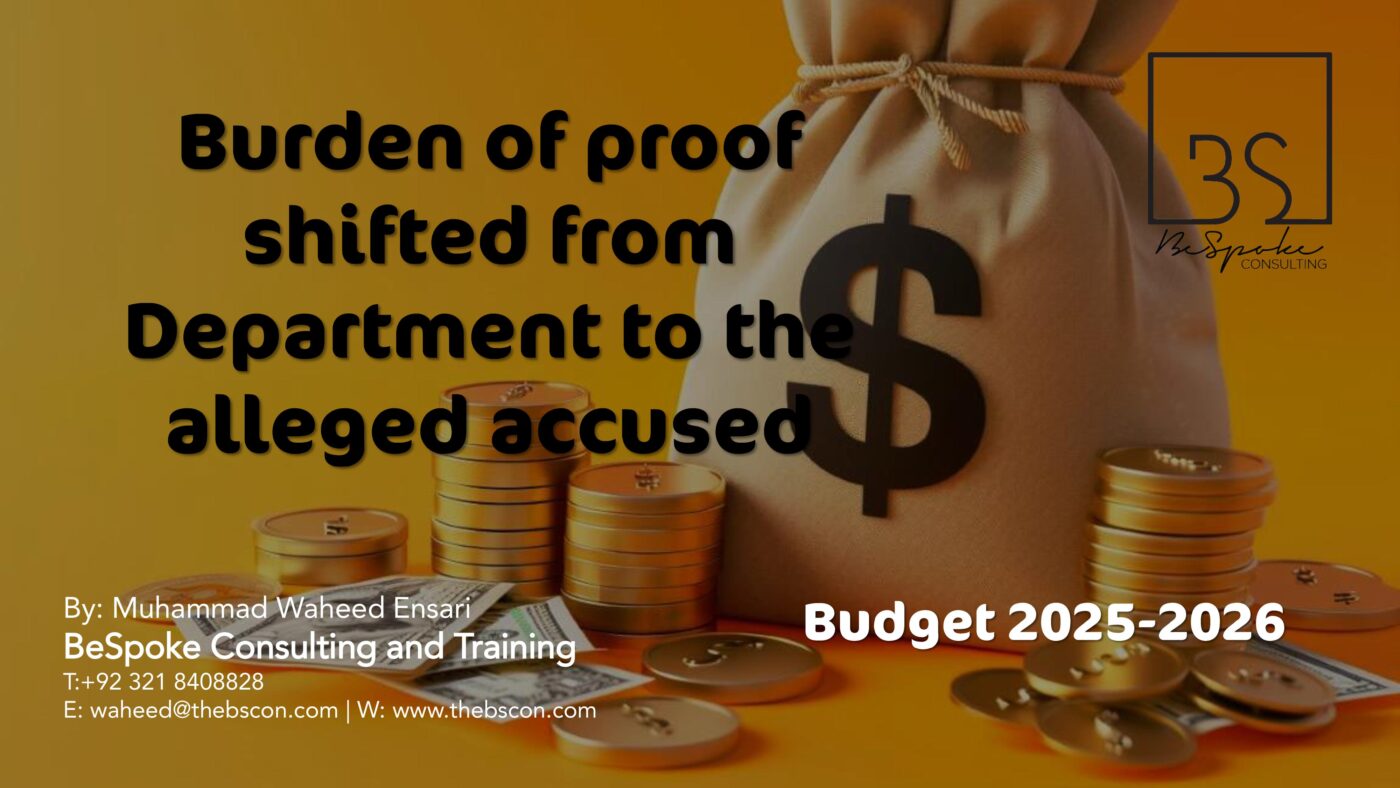Burden of proof shifted from Department to the alleged accused
Burden of proof shifted from Department to the alleged accused: Every person making tax compliance may be brought under the definition of tax fraud, and any person claimed to be accused by the Department will be treated to be guilty unless he proves otherwise. This is sheer violation of the Constitution of Pakistan which states that every accused is treated not to be guilty/innocent unless proven to be guilty.
The most dangerous clause for officers/accountants/consultants of the taxpayers after rider clause, the following new clause (1) shall be inserted, namely:-
“(1) “abettor” means a person who abets or connives in tax fraud as defined in clause (37) of section 2 or in the commission of any offence warranting prosecution under this Act. and includes a person who,-
(a) misuses other registered person’s unique user identifier and password for filing returns or annexures or any other document or unauthorizedly makes change in tax e-profile of any registered person;
(b) prepares, or cause to be prepared with or without authorization of the registered person, invoices for false claim of input tax adjustment;
(c) allows use of bank account held or operated by him for abetting tax fraud or other offence warranting prosecution under this Act or unauthorizedly or illegally maintains or operates business bank account in other registered person’s name; or
(d) has obtained or cause to obtain sales tax registration number for the purpose of paper transactions, including issuance of invoices without involving any taxable activity;
“Innocent until proven guilty” is a fundamental principle in legal systems, meaning an accused person is presumed innocent of a crime until the prosecution proves their guilt beyond a reasonable doubt. This principle safeguards against wrongful convictions and places the burden of proof on the prosecution.
Presumption of innocence
Here’s a more detailed explanation:
-
-
Presumption of Innocence:
Everyone is considered innocent of a crime until a court of law determines otherwise, based on evidence presented by the prosecution.
-
Burden of Proof:
The prosecution (government) has the responsibility to provide sufficient evidence to convince the judge or jury that the defendant is guilty beyond a reasonable doubt.
-
-
No Burden on the Defendant:
The defendant does not have to prove their innocence; the burden is on the prosecution to prove guilt.
-
Fair Trial:
This principle is crucial for a fair and just legal system, ensuring that individuals are not punished before being found guilty by a competent court.
-
Right to Silence:
A person’s right to remain silent during questioning should not be used as evidence of guilt or as a reason for detention, according to Fair Trials.
Substituted Definition of Tax Fraud
“(37) “tax fraud” means knowingly, intentionally or dishonestly doing any act or causing to do any act or omitting to take any action or causing the omission to take any action, to cause loss of tax or attempting to cause loss of tax under this Act, including-
- using or preparing false, forged and fictitious documents including return, statements annexure and invoices;
- suppression of supplies that are chargeable to tax under this Act;
- false claim of input tax credit including based on fictitious transactions;
- making taxable supplies of goods without issuing anytax invoice;
- issuance of any tax invoice without supply of goods;
- suppression and nonpayment of withholding tax in the prescribed manner beyond a period of three months from due date of payment of tax;
- tampering with or destroying of any material evidence or documents required to be maintained under this Act or the rules made thereunder;
- acquisition, possession, transportation, disposal or in any way removing, depositing, keeping, concealing, supplying, or purchasing or in any other manner dealing with, any goods in respect of which there are reasons to believe that these are liable to confiscation under this Act or the rules made thereunder;
- making of taxable supplies without getting registration under this Act;
- generating fake input through manipulation of return filing system of the Board and making fake entries in the sales tax returns or in the annexures; and
- making fictitious compliance of section 73, including routing of payments back to the registered person, or for the benefit of the registered person, through a bank
account held by a supplier or a purported supplier.
Explanation
Any act of commission mentioned in this clause shall be treated as intentional unless the person accused of tax fraud proves that he had no intention, motive, knowledge, or reason to believe that he was committing a tax fraud;”
Read our blogs here and to download Federal Budget 2025-2026 click here.

